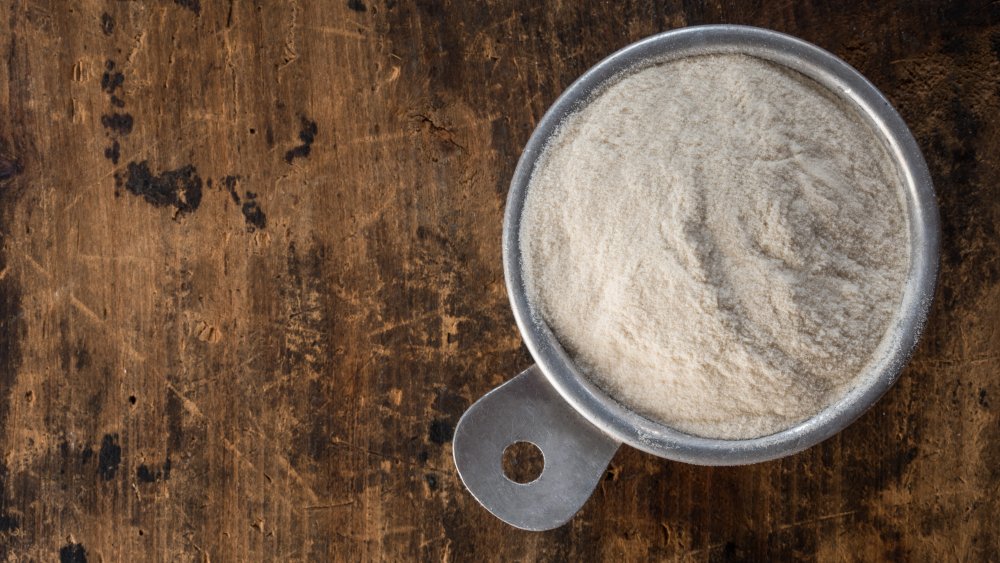What Is Xanthan Gum And Why Is It In Everything?
Many of us have been taught to think twice when we see a product that lists an ingredient with a strange name. But what if that ingredient shows up in a majority of the products we buy? We see xanthan gum listed on labels for everything from yogurt to barbecue sauce, shampoo, gluten-free foods, and even toilet bowl cleaner. So, what in the world is xanthan gum, and should we be eating it?
Xanthan gum is a sugar that's fermented by a bacteria. The result is a powder that is added to any number of liquids (edible or otherwise) in order to thicken or stabilize them. You find xanthan gum listed in so many products because if it wasn't there working its thickening magic, most things would either be a watery mess or wouldn't bind together. For example, xanthan gum replaces the gluten in gluten-free bakery items. Without it, you'd be left with a pile of crumbs.
Did you know that a woman discovered xanthan gum?
It's not often enough that women scientists get a pat on the back for their discoveries. According to UNESCO, just 30 percent of the world's researchers are female. However, back in the 1950s, a chemist named Allene Rosaline Jeanes was making a name for herself at the National Center for Agricultural Utilization Research, according to the USDA.
In addition to developing xanthan gum, Jeanes created a way to mass produce dextran, a polymer that could be used to expand blood volume in cases of severe trauma. Her work on dextran helped save countless lives during the Korean War, and earned her many accolades, according to the USDA. Jeanes name was listed as the primary inventor on the official patent for xanthan gum in 1961, and commercial use kicked off in the 1960s, according to IP Watchdog.
Is xanthan gum safe to eat?
While the origin of xanthan gum may be impressive, we get it. There are a lot of food additives to keep track of, and it's hard to remember which ones are good and which are bad. Luckily, xanthan gum is pretty harmless, and may even have some health benefits, according to Healthline. For example, studies show that xanthan gum may help lower blood sugar, since it's a soluble fiber. It can also increase feelings of fullness, and, with higher doses, lower cholesterol levels.
On the flip side, consumption of large doses of xanthan gum can cause some people to report digestive issues. According to Self Hacked, these symptoms include laxative effects, bloating, and flatulence. Also, those with allergies to corn may need to avoid xanthan gum, according to The Spruce Eats. Overall, xanthan gum, when consumed within products, appears to be safe. Unless you are allergic to, or otherwise avoiding an ingredient in xanthan gum, which is typically created with corn, soy or wheat, according to LifeSavvy, there's no big reason to seek it out, or avoid it.
Are there health benefits associated with consuming xanthan gum?
The main purpose of xanthan gum is to thicken a liquid, such as salad dressing, toothpaste, and yogurt. When we start to think about health benefits, keep the thickening aspect of the ingredient in mind. According to Fact Dr, the major benefit of xanthan gum is a lowering of blood sugar spikes. Because of its viscous properties, xanthan gum can help slow the flow of sugar into your bloodstream.
Studies have also shown xanthan gum to help stroke patients swallow easier, and cancer tumors to slow their growth, according to Fact Dr. It has also been used as a saliva substitute, and to improve bowel regularity. However, these health effects are unlikely to come from the small amount included in everyday products. The studies referred to above were conducted on sample groups, or mice in the case of the cancer study, and involve higher doses of xanthan gum (via Well+Good).
Are there alternatives to xanthan gum?
Whether you experience adverse effects from xanthan gum, or you just don't have any in the house but have a recipe that calls for it, there are substitutes with similar thickening properties to xanthan gum, according to Healthline. You can try psyllium husk, chia seeds (with water), ground flax seeds (with water), unflavored gelatin, agar agar, guar gum, konjac powder, egg whites, or cornstarch.
Keep in mind that, depending on your individual dietary requirements, some of these substitutes may not work for you — for instance the eggs aren't a fit if you're following a vegan diet. Listen to your own body and use the ingredients that work best for you.




